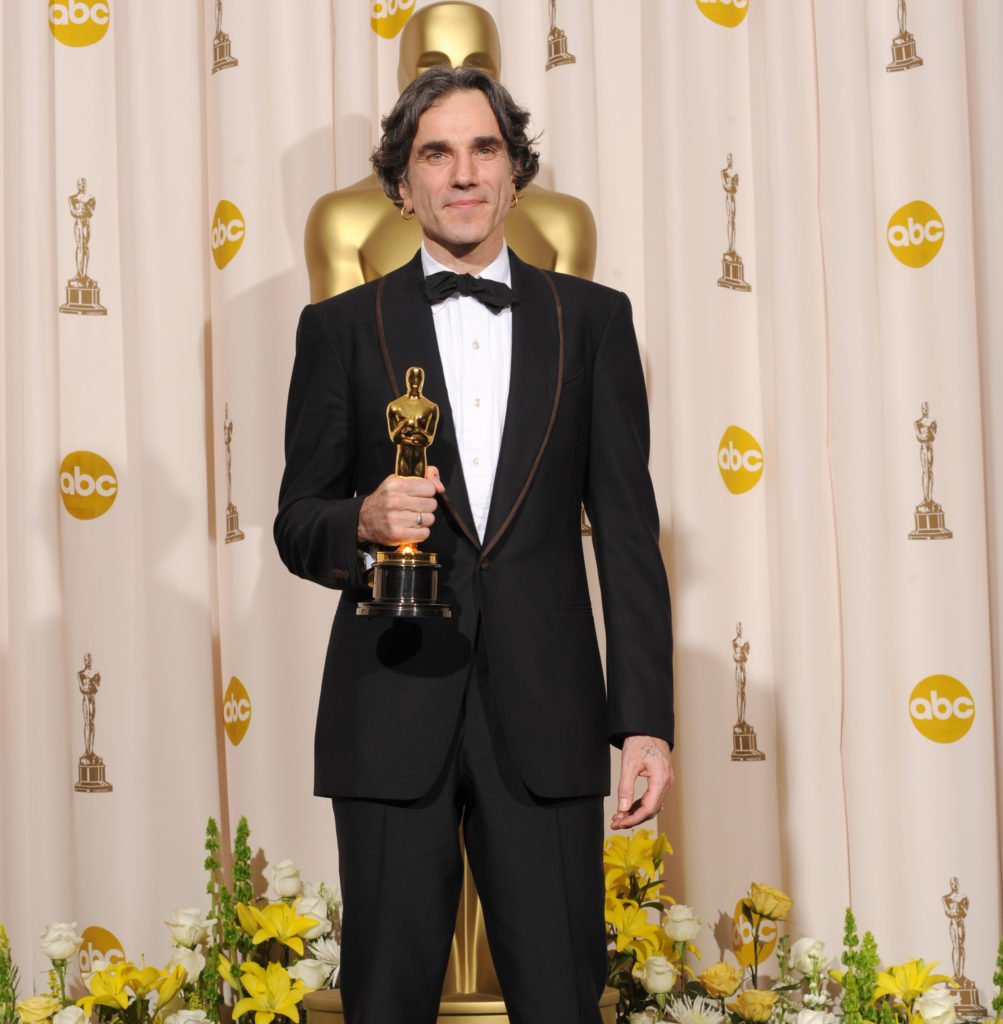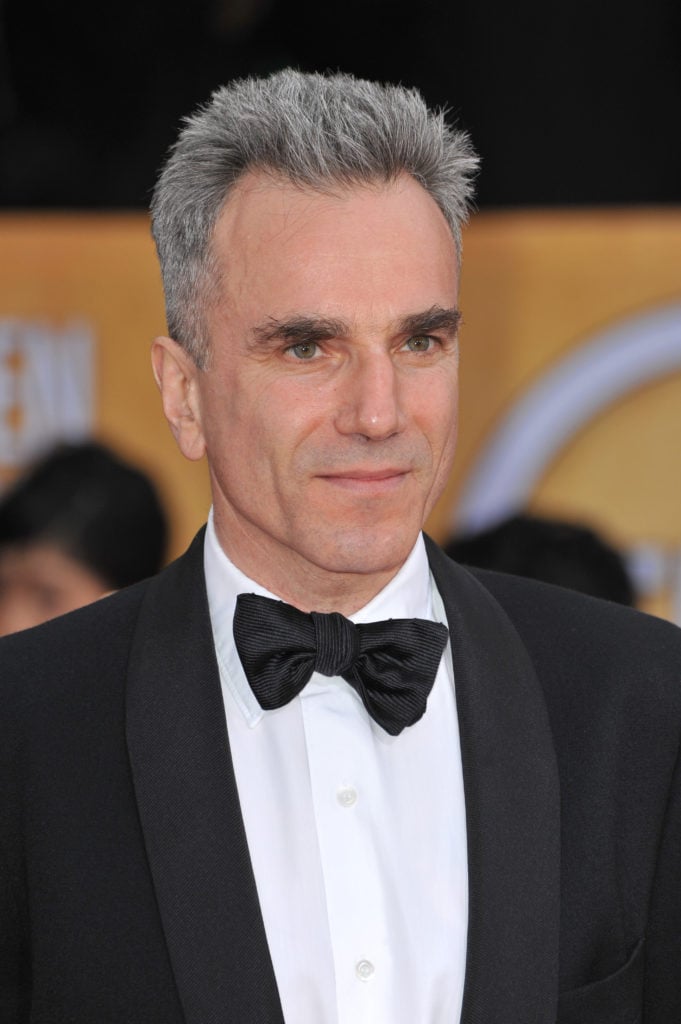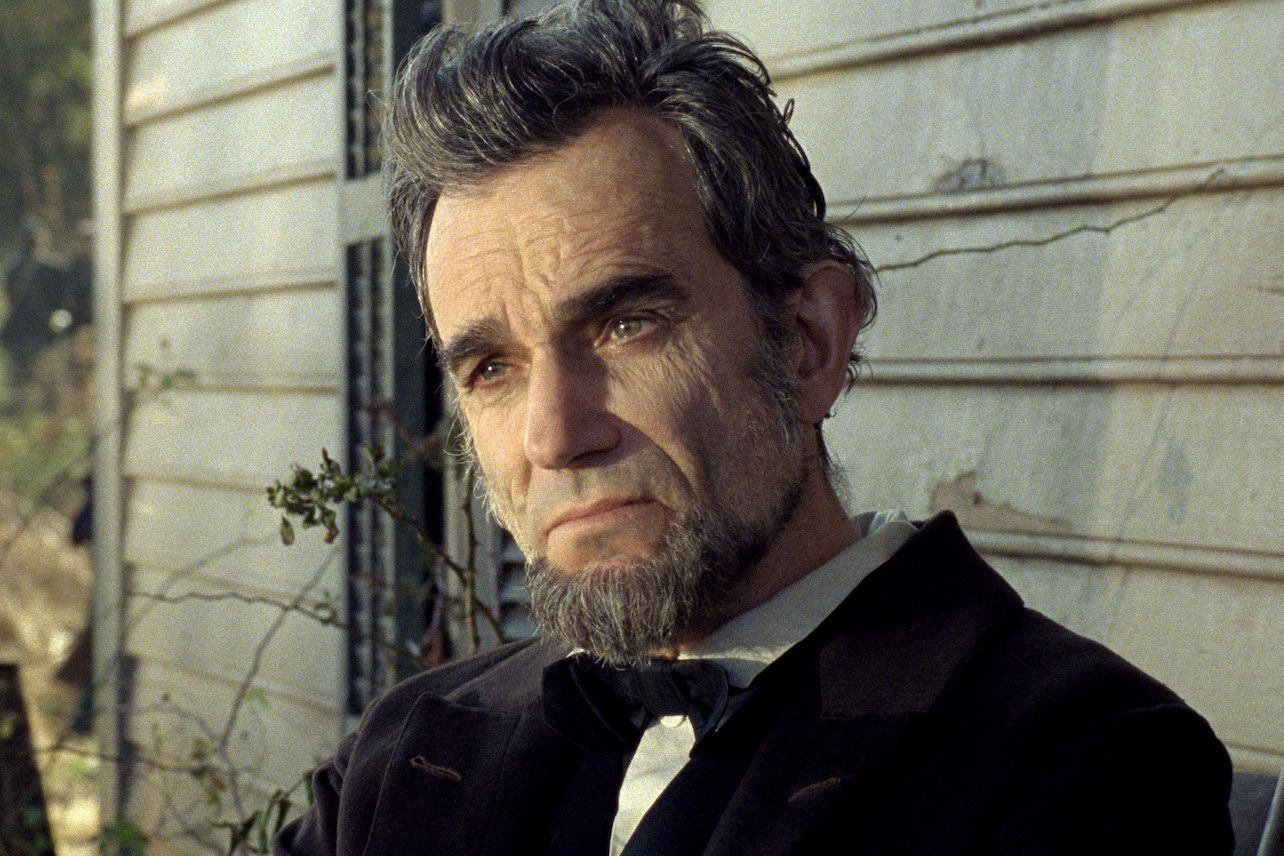
Daniel Day-Lewis Acting Advice
How many times during the day do you find yourself shouting: “Daniel Day-Lewis, you elusive, magnificent genius! Tell me how you do it and let me drink of your oh-so masterful acting juju!” I know … countless times, right? Well here are a few quotes about acting from the legend himself, and some fun facts about Day-Lewis’s legendary process and career.
Updated 1st February, 2022.

Photo credit: Featureflash Photo Agency / Shutterstock.com
Day-Lewis on HIS PROCESS…
“Life comes first. What I see in the characters, I first try to see in life… Most of the movies that I do are leading me toward a life that is utterly mysterious to me… My chief goal is to find a way to make that life meaningful to other people.”
INTERVIEWER: “When did you actually think: ‘all right, I’ve cracked this’?”
DAY-LEWIS: “I don’t know… you don’t feel that, really… What happens is, you make the transition from wondering if you ever will to then not really ever thinking about it again, because you can’t afford to. If you continue to think about that and if the question is still hung over you, you’d more or less be paralysed with a sense of inadequacy… All the work is a kind of mining, and you’re mining for clues. And there are many many clues… that could bare exploration for the rest of one’s days and you’d still feel there was more to learn… So I think what tends to happen is you learn as much as you can, you absorb what you learn and hope out of that will grow something that is true. And you forget everything that you don’t know—which is a lot.”
“It’s a complete illusion, this notion. We create for ourselves this strange delusion that we exchange our lives for someone else’s.”
INTERVIEWER: “Is it true that you stayed in character throughout the entirety of filming?”
DAY-LEWIS: “Well, I don’t know what I was—I was something. Not entirely myself. I always feel like I’m digging my own grave when I talk about this because the dangers are so numerous—either sounding so self important or … adding to the already fairly comprehensive impression that people seem to have that I’m just very strange when I go to work. But it makes complete sense to me, the way I work… I think that one of the misleading things about it is that it seems as if there’s an inordinate amount of calculation involved in this way of working. Which, of course, there isn’t! All you’re trying to do is lay the groundwork, which might allow the imagination to free itself. When the imagination frees itself, you have no goddamn idea what’s going to happen. So it’s not a constrictive or restrictive way of working—quite the opposite… What would drain me much more, in my case, is jumping in and out of that world that we’ve gone to such an inordinate length to create for ourselves, and the life that I’ve gone to great lengths to try to understand, in an internal sense. I could almost say it’s logical for me to remain within that world, but beyond it being logical, it’s my pleasure. Because that’s where the work is. That’s where the discoveries are. You’re not discovering anything when you’re having a cup of tea and a laugh with the grips, as tempting as that would be, because there’s lots of great people on the film set! And I wore myself out, the first couple movies I did—the thing that really drained me was all the socialising on set, because, of course, it’s got nothing to do with the work. But for some people that helps them. It helps them to shrug off the character as if it’s an overcoat and have a laugh and joke around, and that gives them a sense of ease when they put the coat back on again… It could easily seem as if this work—especially as so much of it is done on your own, in preparation – is that it’s a kind of an isolationist exercise. But again, that work that you do on your own is the work that allows you to be open with your colleagues, to be fluid. It allows the imagination to work in response to what they bring, because you have no idea what they’re going to bring.”
FUN FACT! Day-Lewis is most well known for his method approach to acting and the resulting, brilliant performances he delivers. For instance, he won his first Academy Award for playing the artist Christy Brown, a man with cerebral palsy, in the 1989 film ‘My Left Foot’. It has become something of film-industry lore that, after preparing for eight weeks in a cerebral palsy clinic, Day-Lewis committed to the party by spending the entire production in a wheelchair—being carried around set and even being spoon-fed by crew members. The role garnered him widespread acclaim, although there are reports that he suffered two broken ribs from the hunched-over position he had to sustain in the wheelchair.
Method-madness antics such as this continued for every role he has played in his career—so much so that Day-Lewis is something of a poster-boy for its dangerous reputation. In Martin Scorsese’s 1993 film adaptation of ‘The Age of Innocence’, Day-Lewis was cast as Newland Archer, a young gentleman of high society in 19th century New York. While filming, he spent his time strutting about modern-day New York with a top hat, cane and cape, and checked out of his hotel so he could book back in as N. Archer.
But it was delving into his second collaboration with Scorsese that proved a far greater threat to Day-Lewis’ health and safety. In preparing for the cutthroat character of Bill the Butcher in 2005’s ‘Gangs of New York’, Day-Lewis trained with a professional butcher, took circus classes for knife throwing, and even got into the occasional random fight with strangers on the streets of Rome where it was filmed. The most dangerous choice, however, was that Day-Lewis wore nothing but a simple threadbare coat in the dead of European winter as he refused to wear clothing that was not period-authentic. After catching pneumonia, he even resisted medication for being too modern and only accepted taking antibiotics once his illness began to impede his ability to work at all.
Day-Lewis on FINDING THE CHARACTER’S VOICE…
“I wouldn’t expect to find a voice or even look for it for quite a while, because it’s such a deep, personal reflection of one’s character, one’s spirit. But at a given moment, if I’m lucky, as I begin to grow towards an understanding of the person, I begin to hear a voice – I’m listening for it, and I begin to hear a voice – which I don’t try to reproduce, it’s the voice of the inner ear… And then if I live with that for a while and it pleases me, then I set about the task of trying to get it outside myself.”
FUN FACT! Being of Jewish and Northern Irish descent and growing up in a particularly anti-Semitic part of England meant that Day-Lewis encountered a fair amount of bullying from a young age. As a form of self-defence in the dicier neighbourhoods of his youth, Daniel learned to replicate the mannerisms and accents of the locals in order to avoid standing out. He has often likened this to the dawn of his interest in acting and is now renowned for his mastery of transformative voice technique in his performances. Notably, in 1988’s film adaptation of ‘The Unbearable Lightness of Being’, Day-Lewis became fluent in Czech for the ethnically specific role.

Photo credit: Featureflash Photo Agency / Shutterstock.com
Day-Lewis on the REAL LIFE COST OF SUCH DEDICATED WORK…
INTERVIEWER: “It must be draining for you emotionally to be that character, to be somebody else for all that time?”
DAY-LEWIS: “Well, part of my job is to be drained. You absorb and you nourish yourself, you feed yourself for whatever period of time, in this case, a year… Your job, more or less, is to drain yourself of whatever it is you have to offer… It’s misleading to give the impression that that therefore is a voluntary flagellation of some kind, because, for me, it’s important to make the distinction that this work is a joyful thing. Even when you’re exploring areas that could involve great conflict, could involve emotions that are not easy to live with necessarily, nonetheless the underlying sense is the joy of the work.”
“There’s a terrible sadness. The last day of shooting is surreal. Your mind, your body, your spirit are not in any way prepared to accept that this experience is coming to an end. In the months that follow the finish of a film, you feel profound emptiness. You’ve devoted so much of your time to unleashing, in an unconscious way, some sort of spiritual turmoil, and even if it’s uncomfortable, no part of you wishes to leave that character behind. The sense of bereavement is such that it can take years before you can put it to rest.”
“I’m very often still very much alive for that other being and that other world long after the film is finished… Not quite sure what to do with yourself after it’s finished. The investment is usually… if not total, close to total investment of that period of our lives, in the process of telling that particular story. So it’s very hard to conceive of any kind of life after it. Of course, there is one waiting. Usually quite impatiently.”
“What I would really like is not stepping into the limelight at all. But that paradox is fairly common with anyone in the performing arts… Maybe it’s, quite simply, because we can express ourselves through these other vessels in a way that we can’t in ourselves. I suppose that’s the commonly held opinion. But I think more for me – this is an innate understanding, it’s not something I’ve consciously figured out for myself – from the outside, I am, whether I like it or not, a public figure during certain periods like now. Then I disappear, it seems, from the people outside. I seem to disappear. But of course, in my experience, I don’t disappear; I’m just doing other things. And what I’m doing is reengaging with life. And it’s that period of time that allows me to do the work. So these two things are indivisible.”
FUN FACT! As a teenager, Day-Lewis studied woodworking with aspirations to become a cabinet maker. “Being in a workshop is like food and drink to me,” he said. “I love that sense of creation.” This craftsmanship held him in good stead in preparation for the role Hawkeye in the 1992 film ‘The Last of the Mohicans’, when Daniel learned to live off the land by camping, hunting and fishing in the forest, and even building a canoe from scratch. Of course, such dedication was difficult for Day-Lewis to simply abandon post-filming; he later showed up to his family Christmas dinner and ate with his rifle at the table.
To play his role of John Proctor in the 1996 film adaptation of ‘The Crucible’, Day-Lewis utilised his woodwork skills again by building Proctor’s late-16th-century Massachusetts house for the movie. He then proceeded to live in it for the duration of filming—rarely, if ever, bathing. It almost seems hard to believe that it was on this set where he met his current wife Rebecca Miller (daughter of ‘The Crucible”s author Arthur Miller). In his most recent Academy Award speech, Day-Lewis thanked his wife, commenting: “My wife, Rebecca, has lived with some very strange men. I mean they were strange as individuals and probably even stranger if taken as a group. Luckily she’s the versatile one in the family, and she’s been the perfect companion to all of them.”
Of course, Daniel Day-Lewis is the first to acknowledge the costly depths to which he must go in his process. In 1997, he took a five-year break from acting and began working as a cobbler in Florence, Italy. He was only coaxed back into acting by Scorsese and Leonardo DiCaprio, who lured him back to New York under false pretences so they could pitch his role in ‘Gangs’. However, he stated that the ruse was unnecessary: “Martin doesn’t have to convince me about anything … I can only say that I would wish for any one of my colleagues to have the experience of working with Marty once in their lifetime. If you get it twice, it’s a privilege that you don’t necessarily look for but you certainly don’t try to avoid.”
Day-Lewis on CHOOSING ROLES…
“I begin with a sense of mystery. In other words, I am intrigued by a life that seems very far removed from my own. And I have a sense of curiosity to discover that life and maybe change places with it for a while.”
RE: Playing his Academy Award winning role as President Abraham Lincoln in Steven Spielberg’s 2012 ‘Lincoln’
INTERVIEWER: “What is it that finally made you say: ‘Yes, I’m going to do this’?
DAY-LEWIS: “Of course, you make those decisions for very personal and therefore selfish reasons, but at the same time I always ask myself, irrespective of whether I feel compelled to take on the work, I ask myself whether I’m going to be able to serve the director and the story in the way they and it deserved to be served and, in this case, I really just didn’t feel I would be able to do that for a long period of time and I’m not sure I really even felt that when finally I heard myself say ‘yes’ – to my own surprise – but by that time, I had been bitten. That sense of a compelling need to do something is really hard to resist… You can’t account for why you choose to explore one life as opposed to another, but it’s something to do with the passage of time, and at some point I felt… almost as if one’s being drawn into the orbit of another life, almost a physical sensation… That’s usually the warning sign for me… I really don’t know why, except that I can assume that… the mystery of that life is the thing that draws me towards it. But at the same time, in the underground sense, of course, what you’re choosing to do is explore yourself through that other life and without knowing what it was I chose to explore in myself, at that time that was something, for some reason, I felt I needed to do.”
FUN FACT! Day-Lewis has turned down some pretty notable roles made famous by other well-known actors, including Ralph Fiennes’s Oscar-nominated role in ‘The English Patient’, and the role of Aragorn in ‘The Lord of the Rings’ trilogy. He even chose to work on the 1993 film ‘In the Name of the Father’ instead of taking the offer to play the role of Andrew Beckett in ‘Philadelphia’, which went to Tom Hanks. While Day-Lewis hardly ever pursues roles, he reportedly FOUGHT to be cast as Vincent Vega in 1994’s ‘Pulp Fiction’, however writer and director Quentin Tarantino had written the character specifically to be played by John Travolta.
 (Screengrab from ‘Lincoln’)
(Screengrab from ‘Lincoln’)
Day-Lewis on playing PRESIDENT ABRAHAM LINCOLN!
Day-Lewis was offered the titular role in Spielberg’s ‘Lincoln’ over eight years before he eventually agreed to play it, claiming: “It really didn’t occur to me to say yes, it seemed like such an outlandish idea… I looked at it and just thought: ‘That’s a really great job for somebody else…’” His performance would earn him his third Best Actor Oscar. “I felt two things, at one and the same time,” he said. “One was a sense of immeasurable privilege at having been enabled to explore that man’s life. And the other, directly as a result of that, was a sense of great sadness and loss that that time allowed me was now over… There’s never been a human being that I’d met that I loved as much as him. I doubt there ever will be.”
Day-Lewis on THEATRE vs. FILM…
“You don’t merely give over your creativity to making a film – you give over your life! In theatre, by contrast, you live these two rather strange lives simultaneously; you have no option but to confront the mould on last night’s washing up…”
“Laurence Olivier might have been a much better actor on film if he hadn’t had that flippant attitude. [He] was a remarkable actor, but he was entirely missing the point consistently. He felt that film was an inferior form… The thing that Konstantin Stanislavski lays out is how you do the thing the first time every time – 1000 times. That’s the idea you’re always searching for.”
“I see a lot of movies. I love films as a spectator, and that’s never obscured by the part of me that does the work myself. I just love going to the movies.”
FUN FACT! Day-Lewis studied acting at the Bristol Old Vic Theatre School, and went on to perform on the stage for the Royal Shakespeare Company. In the National Theatre’s 1989 rendition of ‘Hamlet’, Daniel played the titular role and, in one performance, he collapsed during the scene when Hamlet is confronted by the ghost of his dead father. Day-Lewis began sobbing, refused to go back on stage and had to end his involvement with the show. While it was publically acknowledged that Day-Lewis was quitting due to exhaustion, he later explained that, “To some extent I probably saw my father’s ghost every night … because, of course, if you’re working in a play like Hamlet, you explore everything through your own experience.” Day-Lewis’s actual father had died years prior to the production, and the theatrical experience left him so traumatised that he has not appeared on the stage since.
Day-Lewis on ACTING…
“As actors we are all encouraged to feel that each job is the last job. They plant a little electrode in your head at an early stage and you think: ‘Be grateful, be grateful, be grateful’. So it’s not without a sense of gratitude that I work. But I couldn’t do this work at all unless I did it in my own rhythm. It became a choice between stopping and taking the time I needed.”
“Acting is about people. Other People. Otherwise, you’re not acting, you’re doing monologues.”
“I’ve been interested in acting since I was 12 years old, and back then… when I began, it was a question of salvation.”
“I suppose I have a highly developed capacity for self-delusion, so it’s no problem for me to believe that I’m somebody else… At a certain age it just became apparent to me that this was probably the work that I would have to do… If I weren’t allowed this outlet, there wouldn’t be a place for me in society.”
“…the responsibility of a creative life, which is both a curse and a blessing. You can never separate them until the day you die. It’s the thing that feeds you and eats away at you; gives you life and is killing you at the same time.”
“The thing about performance, even if it’s only an illusion, is that it is a celebration of the fact that we do contain within ourselves infinite possibilities.”
Retirement And Beyond
In 2017, Daniel Day-Lewis appeared in what is currently his final film role: reclusive fashion designer Reynolds Woodcock in Paul Thomas Anderson’s excellent ‘Phantom Thread’. The film had been his first since ‘Lincoln’ in 2012—by that metric, we could expect his latest film to be released this year in 2022! However, we’re not holding our breath. One of many things Day-Lewis has done in his career is know when to work and when to step away. Over a 46-year career, Day-Lewis appeared in just 21 films—and only two in the past decade. It speaks volumes about the man that we can still find things to learn from him: watching his films, reading his interviews and studying what made him such a treasured part of our craft. Fingers crossed we see him on screens again…
We thank you immeasurably for your service, Sir Daniel Day-Lewis… you bloody legend!

Leave a Reply